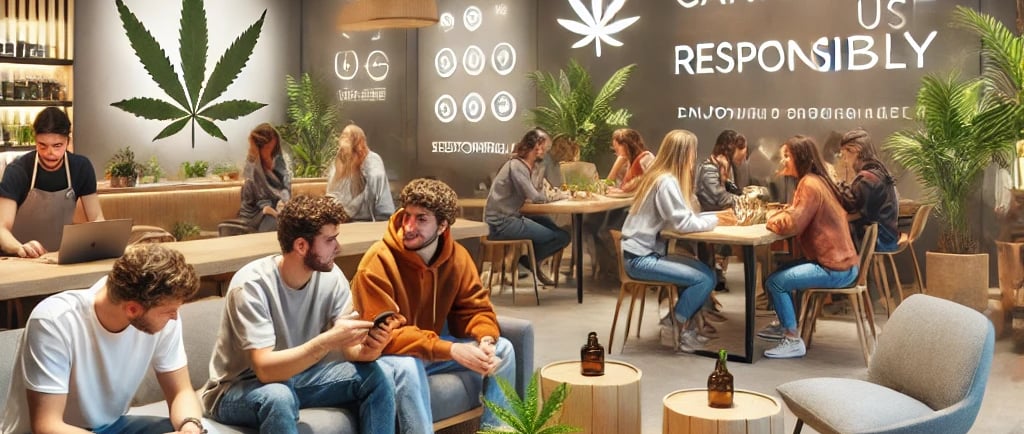Social Perception of Cannabis Clubs in Spain 2025
Cannabis clubs in Spain are a unique phenomenon that has grown steadily over the past few decades. These private, member-based organizations allow individuals to cultivate and consume cannabis in a safe and controlled environment. While their presence has become a hallmark of Spain's progressive approach to cannabis, societal perceptions of these clubs remain nuanced and multifaceted. In 2025, the role of cannabis clubs in Spanish society is shaped by a mix of cultural acceptance, legal ambiguity, and ongoing debates about their broader implications.
CANNABIS GUIDE
1/31/20253 min read


A Brief History of Cannabis Clubs in Spain
The cannabis club model emerged in Spain in the early 2000s as a response to the country's relatively relaxed drug laws. Spain’s legal framework allows for private consumption of cannabis and non-commercial cultivation, which provided a loophole for the establishment of these clubs. Over the years, cities like Barcelona have become global hubs for cannabis culture, with thousands of clubs catering to both locals and tourists.
This growth has brought cannabis clubs into the spotlight, sparking conversations about their role in society, their contributions to local economies, and the challenges they pose.
The Shift in Social Perception
From Stigma to Acceptance
In the early days, cannabis clubs faced significant stigma. They were often viewed as clandestine operations associated with illicit drug use. However, as the clubs professionalized and emphasized responsible consumption, public perception began to shift. Today, many Spaniards see cannabis clubs as legitimate social spaces that promote education, community, and harm reduction.
The normalization of cannabis culture, particularly among younger generations, has further contributed to this shift. For many, cannabis is no longer associated with counterculture or criminality but is instead viewed as a recreational activity akin to enjoying a glass of wine.
Generational Differences
Perceptions of cannabis clubs vary significantly across age groups. Younger Spaniards are generally more accepting of cannabis use and view the clubs as a progressive step toward full legalization. Older generations, however, often remain skeptical, associating cannabis with negative stereotypes. These generational divides are gradually narrowing as public awareness of the clubs' benefits increases.
Regional Variations
Social acceptance of cannabis clubs also differs across Spain's regions. In Catalonia and the Basque Country, where cannabis culture is more entrenched, clubs are widely accepted and integrated into the local community. In more conservative areas, skepticism and resistance are more common, often fueled by misconceptions about cannabis and its users.
The Role of Cannabis Clubs in Local Communities
Cannabis clubs have actively worked to improve their image by engaging with local communities and promoting responsible use. Many clubs host educational events, workshops, and discussions on cannabis-related topics, fostering a sense of community and dispelling myths about cannabis consumption.
Additionally, some clubs have launched initiatives to support local charities, environmental causes, and public health campaigns. These efforts have helped demonstrate that cannabis clubs can be a positive force in society, contributing to both cultural and economic development.
Media Representation and Public Discourse
Media representation plays a crucial role in shaping public perception of cannabis clubs. In recent years, mainstream media in Spain has shifted from portraying cannabis clubs as controversial entities to focusing on their social and economic benefits. Articles and documentaries often highlight the clubs’ role in harm reduction, their contributions to tourism, and their efforts to regulate cannabis use responsibly.
However, sensationalist coverage still exists, particularly in cases involving legal disputes or reports of unlicensed clubs operating outside the law. These stories can reinforce negative stereotypes and create confusion about the legality of cannabis clubs.
Challenges Facing Cannabis Clubs in 2025
Despite growing acceptance, cannabis clubs still face significant challenges:
Legal Ambiguity
The lack of a unified national framework for cannabis clubs leaves them in a legal gray area. This uncertainty can fuel negative perceptions and limit their ability to operate transparently.Stigma and Misconceptions
While attitudes are improving, many Spaniards still hold misconceptions about cannabis use and its effects. Addressing this stigma requires ongoing education and advocacy.Tourism Concerns
The influx of cannabis tourism, particularly in cities like Barcelona, has sparked debates about the impact of clubs on local communities. Critics argue that some clubs prioritize profits over responsible practices, creating tension with residents.
The Path Forward: Changing Minds Through Education
Education remains the key to improving public perception of cannabis clubs in Spain. By fostering open conversations about cannabis use and its benefits, clubs can challenge outdated stereotypes and build trust with the public. Partnerships with universities, healthcare providers, and advocacy organizations can further promote a balanced understanding of cannabis and its role in society.
A Balanced Future
In 2025, cannabis clubs occupy a unique space in Spanish society. They are not only places for cannabis consumption but also hubs for education, culture, and community building. While challenges remain, the growing acceptance of these clubs reflects a broader shift toward a more progressive and informed approach to cannabis.
As societal attitudes continue to evolve, cannabis clubs have the potential to play an even greater role in shaping Spain's cannabis landscape. By prioritizing transparency, responsibility, and community engagement, they can solidify their place as valuable and respected institutions in Spanish society.
